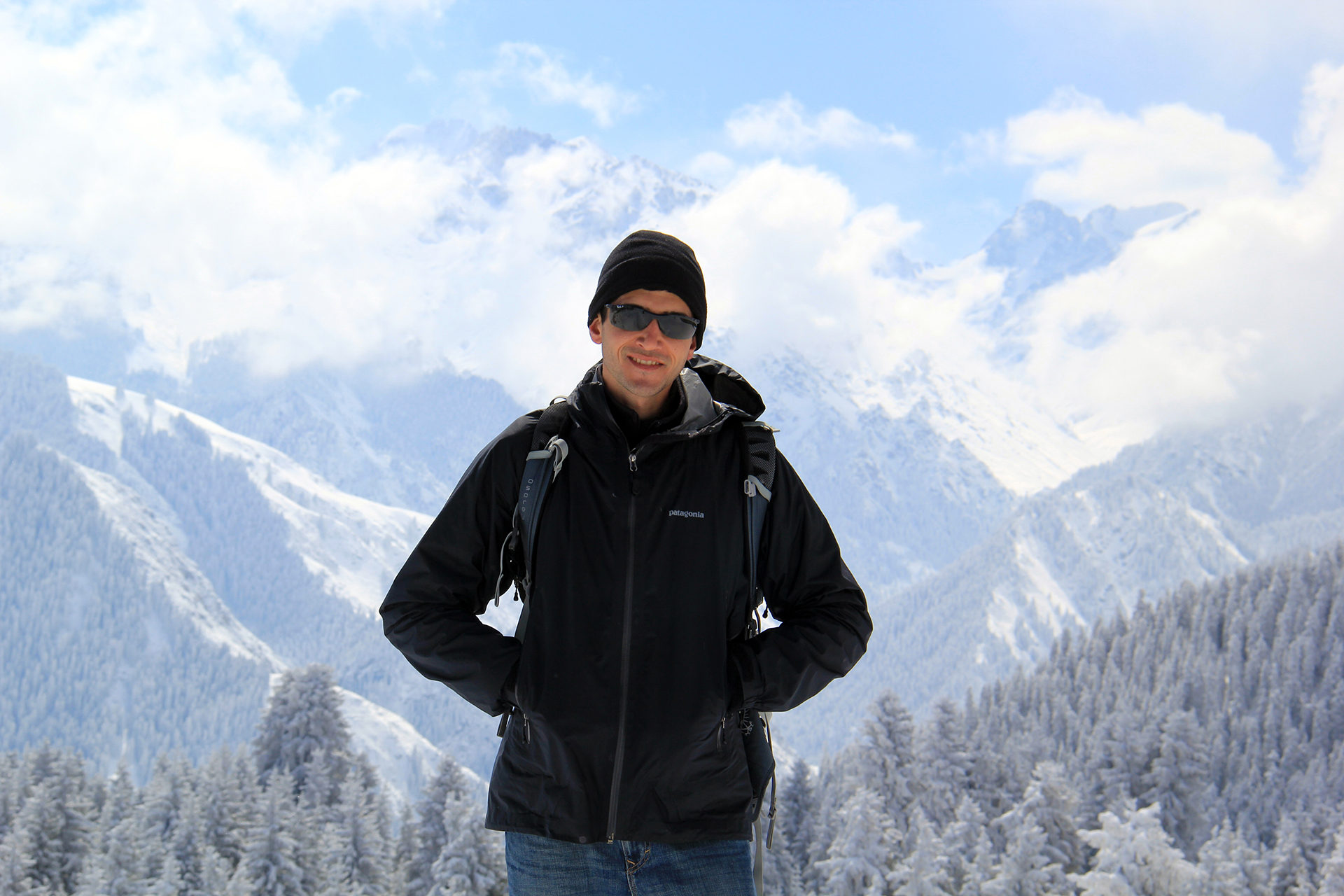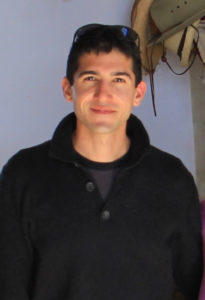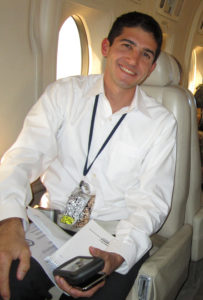Sam Woodworth ’00 Follows Passions to Experience-Filled Career in the U.S. State Department

Sam Woodworth ’00 didn’t plan to end up in Afghanistan. In fact, he didn’t have a plan at all. As he went through his education and career-building, from Greenhills to Vassar College to Stanford Law School to the U.S. State Department, he wasn’t executing a career strategy he’d designed in advance. He was just following the things that interested him.
 “I’m emphatically not one of those people who had some kind of vision and pursued it through and brought it to fruition,” Woodworth said. “I’m kind of the opposite. I’ve always done what appealed to me, what seemed interesting.”
“I’m emphatically not one of those people who had some kind of vision and pursued it through and brought it to fruition,” Woodworth said. “I’m kind of the opposite. I’ve always done what appealed to me, what seemed interesting.”
Following his passions, a value that Woodworth says Greenhills helped instill, has taken him all over the world, from Washington, D.C. to California to Kabul. As a State Department attorney, Woodworth has done all sorts of projects, which is part of what makes his job so interesting. He’s worked to build long-term agreements with the Afghan government; he’s hashed out the legal fine points of lawsuits from alleged enemy combatants against the United States; he’s worked with the Red Cross and other international organizations on developing international humanitarian law. Right now, he’s working on yet another project: managing the State Department’s multi-billion dollar global real estate portfolio.
“We have billions of dollars worth of property around the world,” he said. “We’re constantly buying land to build new embassies, consulates, warehouses, residences, and selling land, doing large, complex leases for office space, for every kind of function that we require. We tend to use a lot of very complicated deal structures, in part because of all the legal requirements that we have, the government contracting requirements. So I’ve really been able to work on a lot of deals that a real estate lawyer wouldn’t get to work on until having spent a long time in their profession, which is typical of work at the State Department. You really get thrown into things that most people wouldn’t get to access until late in their careers.”

Even ending up at the State Department wasn’t Woodworth’s plan from the start. After graduating from Stanford Law School in 2008, Woodworth clerked for federal courts in Florida and California, but still wasn’t sure what he wanted to do. All he knew was that he didn’t want to be a litigator. He wasn’t interested in fighting with people all day.
Then he remembered one of his law professors, who had worked with the State Department and always talked about how interesting it was. The key, he remembered the professor saying, was that at the State Department, lawyers are more important than in most other workplaces.
“As a lawyer, you have an unusually integral role in the process of policy-making and execution,” Woodworth said. “You’re really quite involved, and you’re exposed to a lot of fascinating issues, because we cover all aspects of the department’s operations.”
Woodworth could have gone into the lucrative field of corporate law, but he wasn’t interested. He applied to the State Department, got hired, and soon, was spending a year as a legal advisor to the U.S. Embassy in Afghanistan.
“That was definitely one of the most exciting aspects of my time at State,” he said.
He’s been with the Department ever since.
 Woodworth says his guiding philosophy — following his passions and living life for the experiences, which is the reason he found himself in Kabul instead of a corporate office — goes back to his time at Greenhills. He remembers trips with Tom Friedlander to the University of Michigan’s Mud Lake Bog property, and walks in the woods behind the school, using a dichotomous key to identify plants. In Steve Kahn’s 10th grade English class, he remembers memorizing and reciting the first 18 lines of Canterbury Tales. He has especially fond memories of Orelia Dann’s American Art and Architecture class.
Woodworth says his guiding philosophy — following his passions and living life for the experiences, which is the reason he found himself in Kabul instead of a corporate office — goes back to his time at Greenhills. He remembers trips with Tom Friedlander to the University of Michigan’s Mud Lake Bog property, and walks in the woods behind the school, using a dichotomous key to identify plants. In Steve Kahn’s 10th grade English class, he remembers memorizing and reciting the first 18 lines of Canterbury Tales. He has especially fond memories of Orelia Dann’s American Art and Architecture class.
“That’s always stuck with me,” he said. “I’ve always had a love for early American art and architecture, and I developed a great appreciation for artists in the 18th and 19th centuries whose work she talked about. I really appreciated her passion for that era.”
Woodworth’s Greenhills education also paid off in another big way: it prepared him for college, law school, and the rest of his life. Woodworth remembers some students struggling with the increase in rigor from high school to college. But he barely noticed it. Rigor was something he was already used to.
“The hardest grader I ever had was Mr. Zellers,” he said. “Getting an A from him was harder than getting an A anywhere else I’ve been. It really set the tone.”
In law school, the same thing happened. When he first got there, Woodworth was intimidated, and started to feel the beginnings of imposter syndrome. A lot of his classmates, after all, had been planning and strategizing their legal careers for years, while Woodworth was still figuring out what he wanted to do. But his feelings of insecurity didn’t last long.
“After I started taking exams and acing them, I thought, ‘damn,’” he said. “’These same skills from Greenhills — from Integrated (American History and Literature), which is a course that Mr. Zellers used to teach with Alyce DePree — these same skills have seen me through this whole endeavor.”
At the State Department, Woodworth does most of his work remotely from his 95-acre forest ranch in California. Even working a demanding job, he’s still managed to strike a manageable work/life balance. He gets his work done, but doesn’t work an ordinary nine-to-five day.
“I tend to get my work done at a lot of different hours during the week, sometimes on weekends, sometimes in the evening — whenever,” Woodworth said. “If it’s urgent, it gets done right away. If it’s not urgent, it will get done in a way that’s consistent with my highest productivity, which often involves mixing in some time outdoors.”
The simple philosophy that Woodworth has followed for most of his life — stick with the things that bring you happiness — has paid off even in ways that are hard to notice. Often, for instance, law students can’t stand law school, particularly the first year. But when Woodworth was visiting law schools to decide where he would go, he noticed that Stanford was one of the only places where students seemed genuinely happy. So that’s where he went, and sure enough, he enjoyed his law school years, oblivious to the cut-throat competition that plagues law classes at most other schools.
Now, at the Office of the Legal Adviser at the State Department, Woodworth may have found a career that he’ll enjoy for the rest of his life. Perhaps he will decide to move on one day, but whatever happens, he’s not going to stop following his passions. One thing he might want to explore, for instance, is forestry. He’s seen the crises in California’s forests, and knows that the state has a serious shortage of professional foresters.
“As I’ve developed a more and more intimate relationship with this land and its ecosystem, and as I’ve seen the crisis of forest management in the west, it’s something that I’ve given serious thought to pursuing in a more sustained and focused manner,” he said. “So that could be something at a certain point, whenever I feel that I’ve learned the bulk of what I’m going to in my current position, that I would consider doing.”
It might seem ridiculous to even consider abandoning a career as a State Department lawyer to become a forester. But then again, Woodworth has already been down this road. He could have taken a corporate law job. But he didn’t, because he knew that regardless of the paycheck, what he wanted most from his job was to enjoy it.
“I’ve had the opportunity to experience so many things in my professional life, and as a result of the more humane environment of government public service, also in my personal life,” he said. “Looking back, I just find that that time and those experiences are so much more precious than the extra dollars that I might have earned at a corporate job.”
Greenhills, he remembers, placed special emphasis on the importance of one’s time and passions.
“One thing that Greenhills does instill is the sense of following one’s passion,” he continued. “That’s really important, and it’s easy to lose sight of it when one hits the point of a career and figuring out how to sustain a working adult life. And it’s important not to lose sight of the preciousness of time and experience.”





